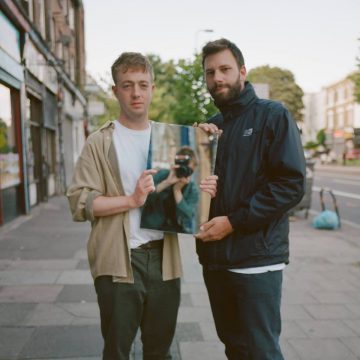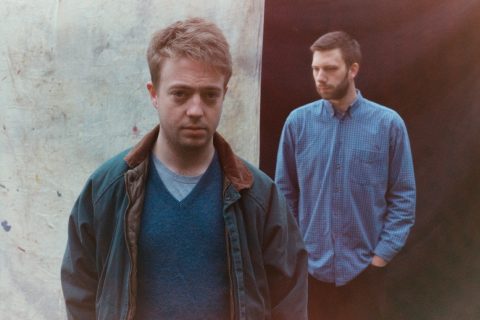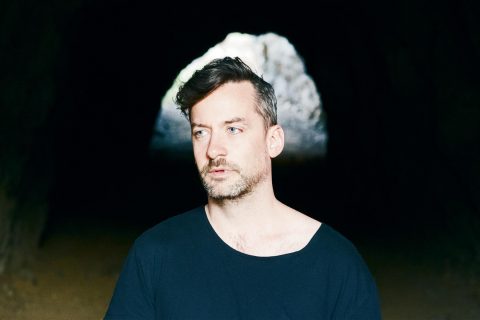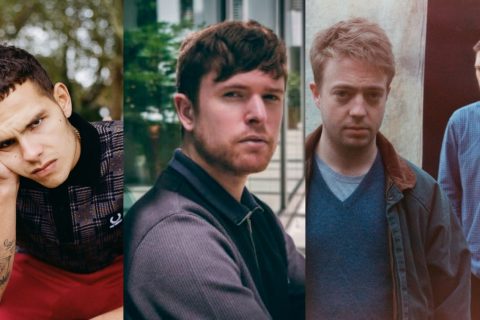Mount Kimbie have created a name for themselves through continuous experiments among synthesis, live percussion, and penetrating vocals from themselves or other notable guests, combining these elements with emotional melodies to construct timeless pieces.
Their new album, Love What Survives, is no different. Arguably more melancholy than their previous full-length, Cold Spring Fault Less Youth, the duo thread a unique path through post-punk, dance, jangly rock and poignant ballads. Similar to their back catalog, Love What Survives is littered with big name guests, featuring another rousing performance from King Krule, English vocalists Micachu and Andrea Balency, as well as two appearances from James Blake.
W were lucky enough to sit with Kai from Mount Kimbie to discuss the new project and everything in between.
SR: Hey Kai, how’s it going mate?
MK: Henry! I’m well mate how are you?
SR: Yeah really well, what time is it over there?
MK: It’s early, 20 past 8.
SR: Ah, early as hell, thanks heaps for getting up to chat!
MK: (laughs) No worries.
SR: So what have you been up to lately?
MK: What have I been up to? I’ve been rehearsing, quite a lot, and doing some festivals as well in Europe.
SR: Oh true, what festivals did you guys hit?
MK: We just finished, the last two were Pukkelpop in Belgium which is always good, and Dockville.
SR: Nice. So I want to talk about your NTS residency over this past year. You and Dom split it from other sides of the Atlantic didn’t you?
MK: We did.
SR: How did that come about and how was it?
MK: We’ve done some before on NTS and I guess it worked quite well for us, I’ll give you a bit more context, in terms of our headspace and where we were at musically, and the kind of the direciton we’d been going in and the things we were exploring for our record. And we were trying to figure out a way to do it, where we were both in the same place and it was just impossible, so the record was about half-made with a lot of back and forth between London and L.A. so it was kind of a good mixture of that.
SR: So speaking of NTS you mentioned you had that show a few years ago as well, or it’s kind of been consistent I guess, but I saw on one of them you had an interview with William Basinski.
MK: Yeah yeah we did.
SR: How was that? And does his music impact yours much at all?
MK: Oh we’re just big fans definitely, and have been since the early days of Mount Kimbie I guess and it was one of the records me and Dom had listened to like, a lot, and really gotten a lot of direct influence from it and trying to recreate some of the textual stuff. So yeah, I’ve always been a huge fan of his stuff. The interview itself was pretty terrifying, because he’s just a kind of large character you know, and he’s been around and seen it all before.
SR: Really!
MK: Yeah, you kind of get the impression (laughs). So yeah we were kind of surprised that he actually wanted to do it and managed to actually make it work around his show, which was that day.
SR: Yeah, wow.
MK: Yeah it was good fun, it was really good fun. He’s actually just a really generous, really nice dude (laughs).
SR: That’s interesting you said that he’s such a large character, like you’d feel someone who is making such textured and I guess emotional music would be almost shy or quiet, or a bit reserved, but that’s really cool to hear.
MK: Yeah, and I think he’s definitely got a very, you know, very flamboyant side as well (laughs).
SR: (laughs) That’s really cool. So some of your biggest records of late have obviously featured King Krule and other big feature acts. How did you first meet Archy?
MK: Umm, how did I first meet him? I met him at a gig I think, at one of his gigs, in London. I had gone with the hearty intention of kinda tapping him up for some work, because I’d heard a bit of his music and I just had this feeling that it would work well together with what we were doing. So yeah I just kind of whispered sweet nothings in his ear until he agreed to come and give it a go.
SR: (laughs) Yeah that’s sick, I’m sure working with someone like him as well would be a pretty incredible learning experience – did you find you and Dom’s creative processes change when you did work with him?
MK: Umm, yes and no. I mean you learn stuff with Archy. He’s pretty similar to us: doesn’t do a lot of takes, isn’t too fussy about how (laughs) how well things are recorded and stuff, so it’s more about getting the energy of the take right than any of the nit-picky stuff. So, apart from that, I don’t know, we’ve learnt lots from Archy. He’s a very confident guy, and that kind of rubs off, not in a kind of bullshit way, but he’s not scared to try stuff and he is actually really prolific – he writes a lot and that’s kind of really inspiring to be around.
SR: Yeah for sure. So your new record comes out in just over a week.
MK: Yep!
SR: For someone who rinsed the hell out of Crooks & Lovers and Cold Spring Fault Less Youth, how does this project differ from those albums? Or did you kind of stick to your guns and build on what you established as a base through Mount Kimbie?
MK: Uhm, it definitely has a different feel to it. I think sonically, the sound is slightly different, it’s more stripped back in terms of the amount of different sounds that are used, it’s like a more concentrated record I think in that way. But it does still go off on tangents in the way that both of those other ones did and it kind of is still fairly concise in the way that those two are as well I felt. But it is quite different, and definitely the influence of kind of the wider band that we play with is more apparent in the recording, and I think it will be to see what people who like those records think.

SR: So in terms of the band being more apparent in the record, do you mean like everything sounds a bit more live?
MK: Yeah, some parts, yeah. Also the actual process of recording was kind of – some of it was taken from, I don’t want to say rehearsal situations because that was quite late on in the process, but kind of playing around and doing kind of longer takes of audio. I think the songs were actually more solidified before they were recorded than ever before, so there’s more of a focus on kind of getting a good take, rather than knitting together a more kind of complicated thing. So there’s just kind of less going on in some ways, and that kind of allows it to be a bolder sound on this one.
SR: Do you think that was because there were more people to bounce ideas off?
MK: Yeah, and you just always want to be learning in some way, and working in an area where you feel like you’re not completely competent in, because that’s how you learn and get better and stuff. So to get that feel like the same excitement as you had when you were making your first album, I think it’s important for me to be doing something that I feel not very sure about.
SR: Yeah definitely. So Dom moved to L.A. and you stayed in London, how was that split at the beginning? Not split I guess, but being separated in terms of getting thoughts and ideas and writing together? You said before that in the context it helped a little bit, but what was that like specifically?
MK: Yeah I guess the time zone difference is the thing that makes it most difficult – the actual communication – rather than kind of the musical side of it. It was more stuff that would normally take like an afternoon, can take like a couple of weeks just going back and forth and trying to catch each other at the right time. So, we ended up kind of doing most of the collaborative stuff either in L.A. or in London, but together anyway, because the Internet is really great for some things, but some element of creative work you just have to be in the same room. So yeah at the beginning it took longer to get into it and then at the end it kind of made us work in a more focused kind of way, because we had to redefine two weeks when we would be in the same country.
SR: And for you because you stayed in London, how does it’s electronic music scene influence you when you write?
MK: I don’t know really. I don’t know if the particular electronic music scene in London- Umm, there is always lots of stuff going on that’s interesting and a lot of that probably isn’t necessarily in electronic music right now in London, it doesn’t seem like it’s going on all around you as it was a few years ago. But, London is just kind of a good place to work because there is something in the air, there is a feeling of urgency that everybody is trying to get something done (laughs). It’s kind of hard to put your finger on it, I’m not sure if it justifies the insane cost of living, but it somehow keeps me here, because there really is a good work ethic going on here.
SR: Just like a consistent buzz I guess?
MK: Yeah, absolutely.
SR: So you guys are off on your next tour then, because the album comes out super soon. That’s October right?
MK: Yep.
SR: Yeah I looked at your schedule and it looks ridiculous – you get like a day off per week while going across a country each time.
MK: (laughs) Yeah.
SR: How are you preparing for that? Is the live show changing up a lot, and are there any guests that you’re going to be taking along for the ride?
MK: We prepared a little bit by just doing festivals. It’s kind of like a baptism of fire, it’s so much harder than doing your own show, it’s really hard. So we’ve already gone through any kind of shit situation on stage already this summer, so I think it’ll be fairly breezy in comparison. It has been different because we have two new people on stage with us – Marc Pell playing drums and Andrea Balency playing kind of synths and stuff. So it’s essentially kind of like a new set up between four of us and we have kind of been doing bits and pieces for like a year now, which is crazy because it doesn’t feel that long, but it’s been a good kind of time of getting to know each other on stage and musically and stuff and feeling like we’re now ready to do something a bit more concentrated. But yeah having days off is actually really difficult because, well having like 7 days off is really difficult, because at the moment we’re kind of playing a gig and then the next time we get a chance to play together again sometimes is when we’re on stage like a week later.
SR: Yeah it’s a bit weird to get back into it.
MK: Yeah it’s a bit weird. So I’m really looking forward to being able to play every night, because you kind of learn and remember what words and feel the kind of language together much easier.
SR: Yeah playing in a studio is completely different from playing on a stage.
MK: Mhmm.
SR: So I guess if you’re doing it day after day you’re learning really quickly.
MK: Yeah exactly right.
SR: So, any special guests?
MK: Not really I guess. There’s some songs that we just don’t touch live, although having said that, if there’s something we wanna play and it has someone else on it and they’re not around, we’ve kind of found parts of the song or a version that we want to play, that we feel is the way we would have gone if they hadn’t sung on it, you know what I mean?
SR: Yep.
MK: So it can be a slightly different version. Andrea who’s on the record will be touring with us, so that’s cool, and whenever people are around, it’s always such a last minute call. So, I mean, I think Archy will pop up from time to time over the next year, but he’s going to be a busy boy as well – he’s about to put his record out. So, yeah whenever possible really.
SR: Well, I’ll let you go now Kai, thank you so much for chatting, and I really look forward to listening to the record.
MK: Cool, thanks a lot.
SR: Take care mate, and enjoy your morning!
MK: Cheers mate, take care.
Mount Kimbie’s third full length album Love What Survives is out now via Warp Recordings, stream it in full below in the Spotify player. Purchase the 12″ here.




Comments